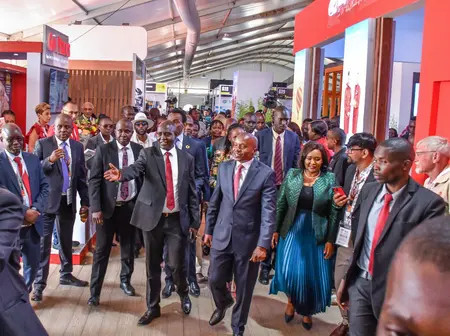Deputy President Kithure Kindiki has called for diversification in Kenya’s tourism offerings, urging the sector to embrace non-traditional attractions and innovative products to remain globally competitive.
While acknowledging the continued appeal of Kenya’s signature wildlife safaris, cultural heritage and coastal retreats, Kindiki said the country must expand its portfolio to include new experiences that appeal to a wider range of visitors.
“I commend the Ministry of Tourism’s efforts to drive the astro-tourism initiative that takes advantage of Kenya’s equatorial positioning. Desert safaris in areas such as Chalbi are also emerging as significant opportunities to rival the Middle East and Asian markets,” he said.
He spoke at the opening ceremony of the 2025 Magical Kenya Travel Expo (MKTE) in Nairobi on Thursday.
The Deputy President pointed to Kenya’s growing reputation as the continent’s “Silicon Savannah,” saying the country could leverage its innovation credentials to attract tech-driven tourism, particularly among young entrepreneurs.
“We must develop new tourist products and exploit untapped potential in non-traditional attractions and regions to spur the sector’s growth. We must capitalise on the opportunities that intra-Africa tourism can provide within the context of the African Continental Free Trade Area,” he added.
Kindiki also stressed the need to market Kenya beyond its wildlife brand, highlighting global icons and achievements that shape the nation’s modern identity.
“Over and above the Kenya of the Big 5 is the Kenya of M-Pesa and mobile money. The Kenya of Eliud Kipchoge, Wangari Maathai, and innovation. Kenya’s identity is one of profound diversity,” he said.
He emphasised culture, sports, faith and heritage tourism as key frontiers for growth, noting Kenya’s archaeological significance in Turkana and the Rift Valley, as well as the richness of its 40-plus communities.
Despite steady growth, Kindiki noted that Kenya’s visitor numbers lag behind continental rivals in North and South Africa.
Kenya remains ahead of East African neighbours but faces rising competition, with Tanzania attracting 2.14 million visitors and Uganda 1.37 million in 2024.
“With Africa emerging as one of the strongest-performing regions in global tourism recovery for 2025, we must do more to tap into this growth and drive performance,” Kindiki urged.
The DP reiterated that the tourism sector is one of the strongest drivers of economic growth in Kenya, with new figures pointing to record gains in both visitor arrivals and revenue.
He said the country welcomed close to 2.4 million visitors in 2024, representing a 15 per cent increase compared to 2023.
Revenues rose by 20 per cent to Sh452 billion (USD 3.5 billion), with domestic tourism cited as a key growth area.
“The World Travel & Tourism Council (WTTC) has revealed that Kenya’s tourism sector is set to contribute a record Sh1.2 trillion (USD 9.3 billion) to the economy in 2025, equivalent to more than 7% of national Gross Domestic Product (GDP),” he stated.
“The sector is also expected to support 1.7 million jobs in 2025 – maintaining over 8% of total national employment. These figures translate into jobs for our youth, markets for our farmers, and sustained customers for our Micro, Small, and Medium Enterprises (MSMEs).

Leave a Reply